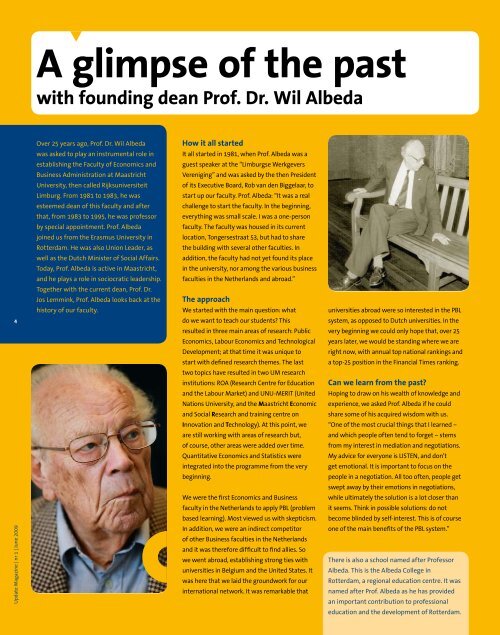Update Magazine - Maastricht University
Update Magazine - Maastricht University
Update Magazine - Maastricht University
You also want an ePaper? Increase the reach of your titles
YUMPU automatically turns print PDFs into web optimized ePapers that Google loves.
A glimpse of the past<br />
<strong>Update</strong> <strong>Magazine</strong> asked how <strong>Maastricht</strong><br />
prepared me for my current job. The<br />
short answer: more than I expected.<br />
with founding dean Prof. Dr. Wil Albeda<br />
4<br />
<strong>Update</strong> <strong>Magazine</strong> | nr 1 | June 2009<br />
Over 25 years ago, Prof. Dr. Wil Albeda<br />
was asked to play an instrumental role in<br />
establishing the Faculty of Economics and<br />
Business Administration at <strong>Maastricht</strong><br />
<strong>University</strong>, then called Rijksuniversiteit<br />
Limburg. From 1981 to 1983, he was<br />
esteemed dean of this faculty and after<br />
that, from 1983 to 1995, he was professor<br />
by special appointment. Prof. Albeda<br />
joined us from the Erasmus <strong>University</strong> in<br />
Rotterdam. He was also Union Leader, as<br />
well as the Dutch Minister of Social Affairs.<br />
Today, Prof. Albeda is active in <strong>Maastricht</strong>,<br />
and he plays a role in sociocratic leadership.<br />
Together with the current dean, Prof. Dr.<br />
Jos Lemmink, Prof. Albeda looks back at the<br />
history of our faculty.<br />
How it all started<br />
It all started in 1981, when Prof. Albeda was a<br />
guest speaker at the “Limburgse Werkgevers<br />
Vereniging” and was asked by the then President<br />
of its Executive Board, Rob van den Biggelaar, to<br />
start up our faculty. Prof. Albeda: “It was a real<br />
challenge to start the faculty. In the beginning,<br />
everything was small scale. I was a one-person<br />
faculty. The faculty was housed in its current<br />
location, Tongersestraat 53, but had to share<br />
the building with several other faculties. In<br />
addition, the faculty had not yet found its place<br />
in the university, nor among the various business<br />
faculties in the Netherlands and abroad.”<br />
The approach<br />
We started with the main question: what<br />
do we want to teach our students This<br />
resulted in three main areas of research: Public<br />
Economics, Labour Economics and Technological<br />
Development; at that time it was unique to<br />
start with defined research themes. The last<br />
two topics have resulted in two UM research<br />
institutions: ROA (Research Centre for Education<br />
and the Labour Market) and UNU-MERIT (United<br />
Nations <strong>University</strong>, and the <strong>Maastricht</strong> Economic<br />
and Social Research and training centre on<br />
Innovation and Technology). At this point, we<br />
are still working with areas of research but,<br />
of course, other areas were added over time.<br />
Quantitative Economics and Statistics were<br />
integrated into the programme from the very<br />
beginning.<br />
We were the first Economics and Business<br />
faculty in the Netherlands to apply PBL (problem<br />
based learning). Most viewed us with skepticism.<br />
In addition, we were an indirect competitor<br />
of other Business faculties in the Netherlands<br />
and it was therefore difficult to find allies. So<br />
we went abroad, establishing strong ties with<br />
universities in Belgium and the United States. It<br />
was here that we laid the groundwork for our<br />
international network. It was remarkable that<br />
universities abroad were so interested in the PBL<br />
system, as opposed to Dutch universities. In the<br />
very beginning we could only hope that, over 25<br />
years later, we would be standing where we are<br />
right now, with annual top national rankings and<br />
a top-25 position in the Financial Times ranking.<br />
Can we learn from the past<br />
Hoping to draw on his wealth of knowledge and<br />
experience, we asked Prof. Albeda if he could<br />
share some of his acquired wisdom with us.<br />
“One of the most crucial things that I learned –<br />
and which people often tend to forget – stems<br />
from my interest in mediation and negotiations.<br />
My advice for everyone is LISTEN, and don’t<br />
get emotional. It is important to focus on the<br />
people in a negotiation. All too often, people get<br />
swept away by their emotions in negotiations,<br />
while ultimately the solution is a lot closer than<br />
it seems. Think in possible solutions: do not<br />
become blinded by self-interest. This is of course<br />
one of the main benefits of the PBL system.”<br />
There is also a school named after Professor<br />
Albeda. This is the Albeda College in<br />
Rotterdam, a regional education centre. It was<br />
named after Prof. Albeda as he has provided<br />
an important contribution to professional<br />
education and the development of Rotterdam.


